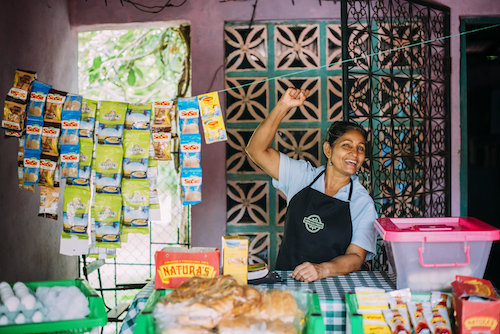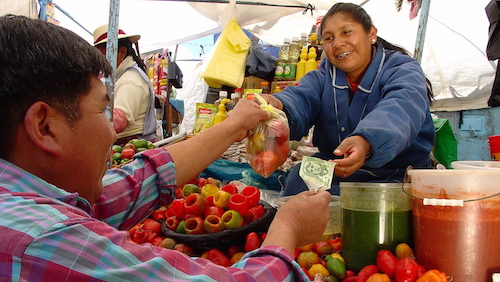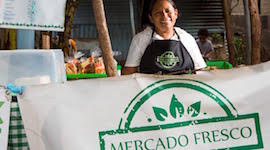
Image credit: Dani Cowan/Supply Hope
A new case study authored by WDI’s Performance Measurement Initiative (PMI) that gives advice to impact investors and investees on new and emerging ways to strengthen their impact measurement practices will be released at two major, international conferences this week.
The case, “Accelerating Measurement within Impact Investing: Five Critical Lessons,” will be shared with attendees at the Latin American Impact Investing Forum (FLII) in Merida, Mexico and the Aspen Network of Development Entrepreneurs (ANDE) “Metrics from the Ground Up” conference in Nairobi, Kenya. It tracks the WDI team as it pilot-tested its new impact measurement framework with three social enterprises in Nicaragua, Brazil and Peru, and provides recommendations to strengthen the impact measurement practices of investors as well as the enterprises they support.
“We are excited to release the case study at these conferences because the five key lessons will be familiar to many in attendance, and may provide useful insights to related measurement challenges they are facing,” said Heather Esper, senior program manager for PMI. “At the FLII event, the attendees will be impact investors or those working with them. The report, which we’re also releasing in Spanish, will be directly relatable to them and provide guidance on how to address key obstacles they encounter when trying to measure the ‘impact’ in impact investing.”
Esper will be joined at the FLII event by Diana Paez, director of WDI’s Grants Management department, to meet with potential partners who are interested in carrying out work similar to the pilot projects featured in the report.
PMI Program Manager Yaquta Kanchwala Fatehi will participate in the ANDE conference, where presenters and the audience will share experiences about different approaches to evaluation, the challenges each approach presents and building bridges between different approaches.
“We will also look to identify potential strategies to address those challenges in the different contexts where participants have done measurement and evaluation,” Fatehi said.
WDI’s case study comes at an opportune time as the call for better impact measurement grows globally. A December 2017 ANDE report found that more than half of the member organizations they surveyed have no full-time staff person dedicated to measurement. Additionally, nearly all respondents spent less than 5 percent of their annual budget on measurement.
Similarly, in a recent report by the Global Impact Investing Network (GIIN) many survey respondents said measurement issues, as opposed to management concerns, were a big challenge. In the GIIN survey, 43 percent of respondents cited significant challenges in collecting quality data, while 32 percent said aggregating, analyzing, and/or interpreting data across a portfolio was a problem for them.
For WDI’s report, the PMI team identified five valuable lessons they learned from working on the three pilots. They are summarized in the table below.
| Recommended activity | Value for Impact Investors and Social Enterprises |
| Use standard indicators, not standard measures | Contextualize data collection to ensure accurate data |
| Use a Theory of Change | Articulate impact, decide what to measure, assign indicators |
| Support M&E capacity building techniques | Speak the same language, conduct M&E without external teams, maintain sustainable M&E practices |
| Mix social outcomes with key business performance indicators | Strengthen mission and ability to scale |
| Foster a senior-level staff as a M&E champion | Help facilitate embedding of data collection into existing business processes |
Rebecca Baylor, a PMI research associate, said the recent reports highlighted the need for businesses and impact investors to reconsider and re-energize how to incorporate measurement into their own practices.
“Our team is excited to engage in that conversation by sharing experiences from our own work,” she said. “Our case study not only speaks to the struggles of individual businesses but also generalizes findings about how to incorporate measurement at scale across multiple similar enterprises.”
This case study shares five valuable lessons for impact investors and enterprises to strengthen their impact measurement practices. The case is based on experiences testing an impact measurement framework with social enterprises in Nicaragua, Brazil and Peru. The case provides recommendations to improve the impact measurement practices of investors, as well as the enterprises they support. For investors, creating a standardized set of indicators to be shared across enterprises is beneficial for aggregating data, using resources efficiently, and facilitating shared learnings across their network of investees. For investees, impact measurement can expose vulnerabilities along the value chain that affect an enterprise, such as turnover and client loyalty.

Image credit: Pro Mujer
WDI welcomes Maria Cavalcanti, president and CEO of Pro Mujer – a nonprofit finance organization that has disbursed more than $3 billion in loans to mainly women-owned enterprises in Latin America – to its Global Impact Speaker Series at the University of Michigan next month.
Cavalcanti will discuss Pro Mujer’s business model, which is centered on gender equity, and take questions from attendees beginning at 5:30 p.m., Nov. 15 in room 1560 of Blau Hall at the Ross School of Business. The event is free and open to the public.
Pro Mujer was founded by Lynne Patterson and Carmen Velasco in Bolivia in 1990 to use microloans to support women-owned businesses. Today, the organization works with entrepreneurs in that country as well as Argentina, México, Nicaragua and Peru. In 2015 alone, Pro Mujer reported providing $330 million in loans to more than 250,000 clients. Operating mainly in urban areas and regions just outside major cities, Pro Mujer also provides direct and indirect health care services through a series of centers and clinics. Services include non-communicable disease detection, dental care and ultrasound diagnostics.
 In early 2016, Cavalcanti (pictured left) was named president and CEO of Pro Mujer. She has ambitious plans to expand the organization.
In early 2016, Cavalcanti (pictured left) was named president and CEO of Pro Mujer. She has ambitious plans to expand the organization.
“As we look ahead, we are focused on amplifying our services and expanding our footprint,” Cavalcanti said in an interview with NextBillion.net, WDI’s affiliated media site focused on business solutions in low- and middle-income economies. “By leveraging partnerships and technology, we are building Pro Mujer as a platform capable of serving millions at a time; a one-stop shop for empowerment for women in the region.”
Cavalcanti holds an MBA from the University of Texas in Austin, a master of science in Information Science from Columbia University in New York, and a bachelor of arts from Universidade Federal do Ceará in Brazil. She is based in New York City, where Pro Mujer is headquartered.
Since 2015, WDI has partnered with the Inter-American Development Bank (IDB) to lead the SCALA Metrics Lab. SCALA is the largest network of micro-distributors in Latin America and the Caribbean. The Metrics Lab assists SCALA member organizations to improve their capacity for impact measurement.
As part of this work, WDI developed and tested a new framework for boosting the impact of small inclusive businesses and their distribution networks with three member organizations in Brazil, Nicaragua, and Peru between January 2016 and May 2017. These pilot projects resulted in strong, context-specific surveys for each organization and monitoring and evaluation training to the staff. The project helped ensure that each organization established appropriate processes for collecting survey data and internalizing impact measurement within their respective programs.
Want to learn more about this project? Check out this example survey or read WDI’s Impact Report: Positive Change Through Actionable Metrics. WDI also teamed up with MIT D-Lab to write a Lean Research case study about the work.
WDI finalized three project reports, one for each organization, that can be used by the social enterprises as they proceed with their impact measurement work:
The Vital Voices GROW Fellowship invests in women business owners in emerging economies over a yearlong fellowship. Here, four business owners talk with Nathan Rauh-Bieri about how, in the final stage of the fellowship, they implemented and revised their action plans and evaluated progress toward their growth goals.
As part of his continuing series, Nathan Rauh-Bieri checks back in with participants in the year-long Vital Voices GROW Fellowship. In a world growing more “virtual” by the day, he learned there’s still plenty of value in entrepreneurs meeting face to face.
WDI’s Performance Measurement Initiative is partnering with the Inter-American Development Bank (IDB) to pilot test a new framework for boosting the impact of small inclusive businesses and their distribution networks in Brazil, Nicaragua, and Peru.

Heather Esper, senior program manager of WDI’s Performance Measurement Initiative (PMI), developed the framework for IDB’s SCALA network, a platform to scale the impacts of inclusive and social business in Latin America and the Caribbean. Through SCALA, anchor companies, microfinance institutions, academia, and non-governmental organizations combine efforts to grow micro‐distribution networks based on micro-franchising models. Those models in turn provide business opportunities and access to products and services to those living at the base of the economic pyramid.
Esper first presented the SCALA metrics framework at a conference last year in Mexico which includes a mix of standardized social and business metrics over the short and long term. These indicators can be tailored to each organization in the network. Over time, the framework reveals the impact each venture is having on the micro-distributors, the people SCALA aims to help.
Following the Mexico conference, there was great interest in having WDI’s PMI team pilot the framework with different micro-distribution organizations in SCALA’s network. The goal of piloting is to test and refine the framework, as well as gauge how well these ventures improve the lives of their micro-distributors. The pilot also will inform best practices for other organizations within SCALA to adapt and implement the framework to assess their impacts in Brazil, Nicaragua, and Peru.
“SCALA would like everyone in the network to use this standardized framework,” Esper said. “We’re working closely with three organizations to pilot the framework in order to assess how easy or difficult it is for them to use. We also want to examine how it creates value for the organizations – such as informing decision-making – in order to refine the framework and develop training materials for the roll out of the framework to the rest of the network.”
The three organizations that are part of the pilot are:
Starting in May, Esper and her PMI colleagues Yaquta Kanchwala Fatehi, PMI senior research associate, and Becca Baylor, PMI research associate, adapted the framework presented in Mexico City to each organization by identifying context-specific indicators for each venture that would properly reflect the impact on the micro-distributors, and developed a data collection process plan.
The team is currently developing surveys for the three organizations, which will include a pre-test, and once complete will focus then on collecting the data, analyzing it, and writing a final report that shares the lessons learned during the pilot in addition to reporting on the findings and methodology. Esper and Baylor will travel to Peru in September to pretest the survey with Chakipi.
“We aim to compare these standardized indicators across the three organizations for the final assessment,” Esper said.
Before the pilot is completed in February 2017, Esper and Baylor will share the progress to date at the SCALA annual meeting in Cali, Colombia in October.
There are many benefits if all organizations within SCALA used the same assessment framework, Esper said.
“If all organizations within SCALA are collecting the same metrics, then learning across organizations can be improved,” she said. “There would be more systematic learning between organizations if they report these standardized indicators annually to SCALA. For instance, this work can lay the foundation for SCALA to better predict client loyalty, distributor growth capacity, as well as address vulnerabilities across the value chain. SCALA can also aggregate the findings and make a business case about the impacts of the micro-distribution model and the value of the network to the broader community.”
Each summer, as part of its mission to provide high-quality learning opportunities to University of Michigan students, WDI sponsors interns who work overseas with international organizations.

This year, five U-M graduate students representing five different schools across campus are working in the education, healthcare and poverty alleviation fields. The projects are based in Ghana, Rwanda, Ethiopia, India, Peru and the Philippines.
In addition to providing the students with meaningful business and cultural experience that comes with working internationally, the summer internships also provide WDI’s five initiatives with important insights from the field. This summer’s internships are managed in collaboration with WDI’s Performance Measurement Initiative (PMI), Education Initiative, and Healthcare Initiative.
“The PMI team is excited to provide measurement advice and support to WDI’s interns, learn from their related experiences, and apply those learnings to current and future projects,” said PMI Program Manager Heather Esper. “In particular, we are interested in learning more from the Pearson Affordable Learning Fund/ Affordable Private Education Centres internship in the Philippines. (Learn more about these projects below). Implementing and institutionalizing a new measurement system centered on learning, and conducting demand analyses and customer segmentation are both areas of great interest to our partners.”
Here are the interns and their projects.
Naomi Wilson, School of Education
Organization: Pearson Affordable Learning Fund (PALF) in partnership with Omega Schools
Country: Ghana
PALF makes minority equity investments in for-profit companies to meet the growing demand for affordable education across emerging market countries. Their vision is to help millions of children in the world access a quality education in a cost effective, profitable and scalable manner. Additionally, organization wants to demonstrate to governments and donors that private education can help to educate their youngest citizens in an efficient way.
Omega Schools is a chain of affordable schools in Ghana delivering quality education affordably to 15,000 low-income students.
As Omega continues its growth, it needs a structured, evidence-based, and easy-to-use software tool for selecting new school sites and determining what price point would be appropriate for specific locations. Wilson will research similar tools already in place, analyze enrollment and profitability of current schools, visit current and potential school site and identify key factors to be considered in site selection.
Michael Manansala, Ford School of Public Policy
Organization: PALF in partnership with Affordable Private Education Centres (APEC)
Country: The Philippines
APEC is a chain of affordable, high-quality secondary schools based in metro Manila focused on employability and life skills.
Manansala will aim to improve annual student assessment and quarterly academic reporting by analyzing existing student performance data and benchmarking it against publicly available data to determine learning outcomes. He also will review existing research and conduct a series of qualitative customer interviews and quantitative customer surveys to better understand why some parents send their children to APEC while others don’t.
Carissa De Young, Ross School of Business/School of Natural Resources and Environment
Organization: Shared-X
Country: Peru
Shared-X is a for-profit, startup social impact business in its first year of operation. It works to lift thousands of farmers out of extreme poverty by deploying advanced farming techniques on highly productive land to close the agricultural yield gap between developed and developing nations. Through the direct sale of specialty crops to international markets, Shared-X provides social, environmental, and economic benefits to local farming communities and generates strong returns for shareholders. Shared-X operates test farms that demonstrate best farming practices and secure contracts for its crops. It then expands access to its technology and markets to smallholder farmers in surrounding communities.
De Young will design a strategy to measure, communicate, and expand the social impact of Shared-X’s model of engagement with smallholder farmers. She will identify and measure impact by conducting interviews with stakeholders and experts ranging from current and potential future cooperative members, Shared-X personnel, and leaders in similar companies. She will then compare her findings with industry best practices to create a proposal for key performance indicators.
De Young also will identify a pathway to continue replicating the Shared-X model with additional smallholder farmers in other regions where Shared-X farms exist.
Elisabeth Michel, School of Public Health
Organization: The Ihangane Project (TIP)
Country: Rwanda
TIP empowers local communities to develop sustainable, effective, and patient-centered health care delivery systems that holistically respond to the needs of vulnerable populations. It envisions a world in which quality health care leads to healthy, inclusive, and empowered communities. TIP has been working with Ruli District Hospital in Rwanda and its seven associated health centers to determine key strategies for improving health outcomes within the community.
Michel will facilitate a successful hospital retreat that creates a shared vision of high-quality and patient-centered health care at Ruli, and includes an implementable framework for decision-making and problem solving. She also will help the hospital staff implement recommendations that come from the retreat.
Dilparinder Singh, Ross School of Business
Organization: PATH
Countries: India and Ethiopia
PATH is a Seattle-based international, nonprofit health organization that creates sustainable, culturally relevant solutions, enabling communities worldwide to break long-standing cycles of poor health. PATH is one of many global health organizations working with countries to reduce malaria deaths.
Singh will work with PATH to conduct a market landscape of current malaria testing and treatment algorithms in Ethiopia. He also will work with PATH’s India Innovation Hub, which encourages innovative approaches to healthcare.
Case study on the impact of Villa Andina on alleviating poverty on children age eight years and younger. Villa Andina operates in Peru and produces high-quality agro-industrial food products through its work with local smallholder farmers. The venture trains framers in organic cultivation techniques and provides guaranteed payment for the crops produced.
Assessment of the role BoP ventures can play in alleviating poverty on children age eight years and younger. This article aggregates impact findings across the six ventures including businesses that sell a product to the BoP, businesses that sell a service to the BoP, and businesses that source from the BoP. The ventures analyzed, work across a range of sectors including housing, renewable energy, sanitation, health care, as well as export-based and locally-based agribusinesses. It compares and contrasts the types of impact experienced by children across different stakeholders, both within the venture and across the six ventures.